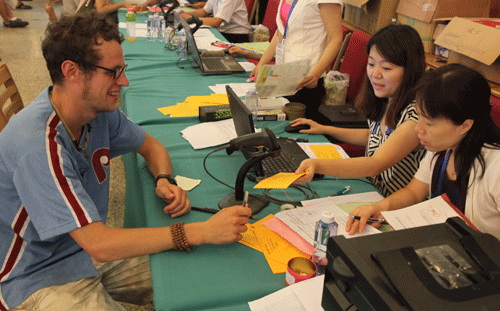Global minds descend upon Chinese universities to study
|
Two teachers at Peking University help David Corey Schultz from the United States enroll in the University's School of Chinese as a Second Language on Friday, ahead of the new semester. Wang Tiantian / for China Daily |
More international students are working toward degrees from Chinese universities.
Alina Scalora sat in the middle of the hall filled with new arrivals at Peking University on Friday. The hall was crowded on the first day of enrollments for international students.
Although still suffering jetlag, Scalora, 25, who arrived at Beijing two days earlier, is excited about her new life as a masters student in the public policy program at Peking University.
The United States native can speak fluent Mandarin, but was humble about her language skills. "I can only speak a little Chinese," she said in perfect Mandarin.
It is not Scalora's first visit to China. In 2010, thanks to Fulbright funding, she stayed in Xi'an, the capital of China's Northwestern Shaanxi province, for one year to participate in a research project studying grassland desertification in western China.
"I'm very interested in environmental policies in China. I want to know more about it and China itself," she said, adding that this interest was her main motivation to apply for a masters program at Peking University.
Scalora is one of the 1,500 new international students at Peking University in 2012, and nearly 900 of them are pursuing degree studies.
According to the International Students Division Office of International Relations at Peking University, in 2012, 359 international students came for undergraduate programs, 367 for master programs, and 75 for doctoral programs.
Most of the international students are majors in social sciences. Majors such as international relations, MBA and Chinese are top choices.
Peking University has 3,300 long-term international students, and 2,200 of them are studying for a degree.
There are an additional 6,000 students who are in China for one year, to pursue short-term study at Peking University.
According to a teacher from the International Students Division who refused to be identified, there is a 17 percent of increase in the student population pursuing graduate degrees compared to the previous year.
"The increase has remained at about 20 percent each year since 2009," he added.
"Most of the students studying for a degree are from Asia, and they are already able to speak fluent Mandarin. The exchange program has taken more students from North America and Europe."
Tuition for international students is a little more expensive than for Chinese students. The annual tuition cost of social sciences is about 26,000 yuan ($4,200). Natural science and engineering costs about 30,000 yuan a year. But if the instruction language is English, the cost will rise to 33,000 to 39,000 yuan a year.
Jiang Ying, a staff member from the Overseas Students Affairs Office of Beijing Foreign Studies University, said BFSU has also taken more degree-targeted international students than before.
In the spring semester of 2012, there were 1,400 long-term international students at BFSU, and about 55 percent were working toward a degree.
The majority of them major in Chinese and international business.
The population of international students who study for a degree has exceeded the non-degree students since the 2011-12 academic year at BFSU.
Figures from the Ministry of Education show that over 290,000 overseas students studied in China in 2011, a 10.3 percent increase since 2010.
Among the students, 118,837 of them are studying for a degree, accounting for 40.6 percent of the overall international student population, which has increased 10.62 percent from 2010.
Lu Xiaopeng, director of the Chinese Division of the School of Chinese Language and Literature at BFSU, has witnessed the number of international students degree study programs grow.
"The increasing bilateral trade cooperation between China and neighbor countries has produced more job opportunities for students who have a Chinese university degree," Lu explained, adding that students from Japan and Korea mostly intend to study for undergraduate degree programs.
Ji Jin contributed to this story.
luowangshu@chinadaily.com.cn

























